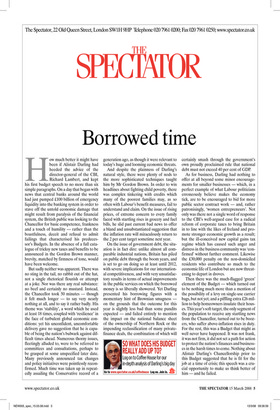Borrowed time
How much better it might have been if Alistair Darling had heeded the advice of the director-general of the CBI, Richard Lambert, and kept his first budget speech to no more than six simple paragraphs. On a day that began with news that central banks around the world had just pumped £100 billion of emergency liquidity into the banking system in order to stave off the untold economic damage that might result from paralysis of the financial system, the British public was looking to the Chancellor for basic competence, frankness and a touch of humility — rather than the boastfulness, deceit and refusal to admit failings that characterised his predecessor’s Budgets. In the absence of a full catalogue of tricksy new taxes and benefits to be announced in the Gordon Brown manner, brevity, matched by firmness of tone, would have been welcome.
But sadly neither was apparent. There was no sting in the tail, no rabbit out of the hat, not a single rhetorical flourish or attempt at a joke. Nor was there any real substance: no beef and certainly no mustard. Instead, the Chancellor took 50 minutes — though it felt much longer — to say very nearly nothing at all, and to say it rather badly. His theme was ‘stability’, a word which he used at least 18 times, coupled with ‘resilience’ in the face of turbulent global economic conditions: yet his unconfident, uncomfortable delivery gave no suggestion that he is capable of being the nation’s bulwark against difficult times ahead. Numerous thorny issues, fleetingly alluded to, were to be referred to committees and consultations, perhaps to be grasped at some unspecified later date. Many previously announced tax changes and policy initiatives were pointlessly reconfirmed. Much time was taken up in repeatedly assailing the Conservative record of a generation ago, as though it were relevant to today’s huge and looming economic threats.
And despite the plainness of Darling’s natural style, there were plenty of nods to the more sophisticated techniques taught him by Mr Gordon Brown. In order to win headlines about fighting child poverty, there was complex tinkering with credits which many of the poorest families may, as so often with Labour’s benefit measures, fail to understand and claim. On the issue of rising prices, of extreme concern to every family faced with startling rises in grocery and fuel bills, he slid past current bad news to offer a bland and unsubstantiated suggestion that the inflation rate will miraculously return to the 2 per cent target sometime next year.
On the issue of government debt, the situation is in fact dire: unlike almost all comparable industrial nations, Britain has piled on public debt through the boom years, and is set to go on doing so at least until 2012, with severe implications for our international competitiveness, and with very unsatisfactory results in terms of actual improvements in the public services on which the borrowed money is so liberally showered. Yet Darling presented his borrowing figures with a momentary hint of Brownian smugness — on the grounds that the outcome for this year is slightly less bad than some pundits expected — and failed entirely to mention the impact on the national balance sheet of the ownership of Northern Rock or the impending reclassification of many privatefinance deals, the combination of which will certainly smash through the government’s own proudly proclaimed rule that national debt must not exceed 40 per cent of GDP.
As for business, Darling had nothing to offer at all beyond some minor encouragements for smaller businesses — which, in a perfect example of what Labour politicians erroneously believe makes the economy tick, are to be encouraged to bid for more public sector contract work — and, rather patronisingly, ‘women entrepreneurs’. Not only was there not a single word of response to the CBI’s well-argued case for a radical reform of corporate taxes to bring Britain in to line with the likes of Ireland and promote stronger economic growth as a result; but the ill-conceived new capital gains tax regime which has caused such anger and distress in the business community was ‘confirmed’ without further comment. Likewise the £30,000 penalty on the non-domiciled residents who contribute so much to the economic life of London but are now threatening to depart in droves.
Then there was the much-flagged ‘green’ element of the Budget — which turned out to be nothing much more than a mention of the possibility of a levy on single-use carrier bags, but not yet; and a piffling extra £26 million to help homeowners insulate their houses. This year’s soft target, the only segment of the population to receive any startling news from the Chancellor, turned out to be boozers, who suffer above-inflation rises in duty. For the rest, this was a Budget that might as well never have happened. It was not frank, it was not firm, it did not set a path for action to protect the nation’s finances and businesses in the harsh times to come. Nothing about Alistair Darling’s Chancellorship prior to this Budget suggested that he is fit for the job at a time of crisis; this speech was a crucial opportunity to make us think better of him — and he failed.


























































































 Previous page
Previous page